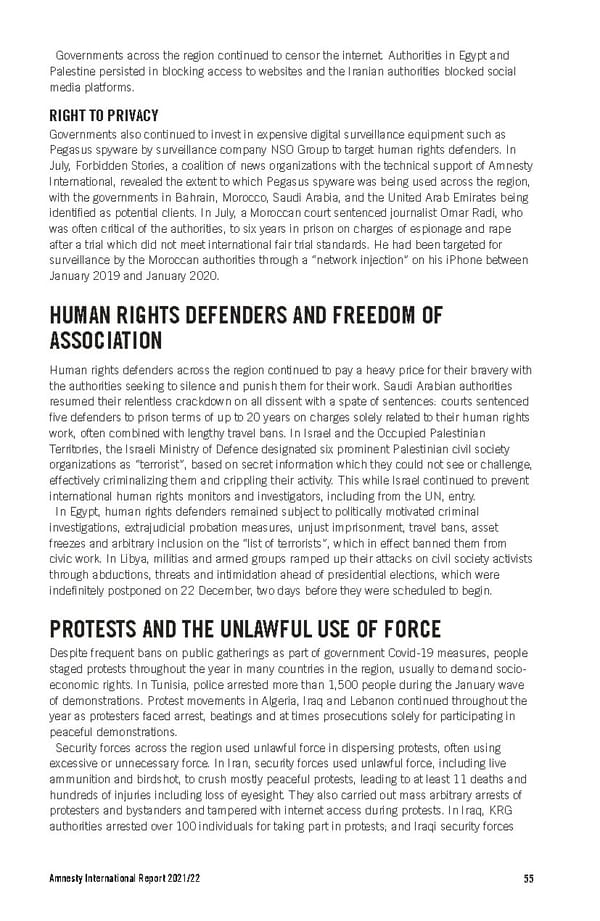Governments across the region continued to censor the internet. Authorities in Egypt and Palestine persisted in blocking access to websites and the Iranian authorities blocked social media platforms. RIGHT TO PRIVACY Governments also continued to invest in expensive digital surveillance equipment such as Pegasus spyware by surveillance company NSO Group to target human rights defenders. In July, Forbidden Stories, a coalition of news organizations with the technical support of Amnesty International, revealed the extent to which Pegasus spyware was being used across the region, with the governments in Bahrain, Morocco, Saudi Arabia, and the United Arab Emirates being identified as potential clients. In July, a Moroccan court sentenced journalist Omar Radi, who was often critical of the authorities, to six years in prison on charges of espionage and rape after a trial which did not meet international fair trial standards. He had been targeted for surveillance by the Moroccan authorities through a “network injection” on his iPhone between January 2019 and January 2020. HUMAN RIGHTS DEFENDERS AND FREEDOM OF ASSOCIATION Human rights defenders across the region continued to pay a heavy price for their bravery with the authorities seeking to silence and punish them for their work. Saudi Arabian authorities resumed their relentless crackdown on all dissent with a spate of sentences: courts sentenced five defenders to prison terms of up to 20 years on charges solely related to their human rights work, often combined with lengthy travel bans. In Israel and the Occupied Palestinian Territories, the Israeli Ministry of Defence designated six prominent Palestinian civil society organizations as “terrorist”, based on secret information which they could not see or challenge, effectively criminalizing them and crippling their activity. This while Israel continued to prevent international human rights monitors and investigators, including from the UN, entry. In Egypt, human rights defenders remained subject to politically motivated criminal investigations, extrajudicial probation measures, unjust imprisonment, travel bans, asset freezes and arbitrary inclusion on the “list of terrorists”, which in effect banned them from civic work. In Libya, militias and armed groups ramped up their attacks on civil society activists through abductions, threats and intimidation ahead of presidential elections, which were indefinitely postponed on 22 December, two days before they were scheduled to begin. PROTESTS AND THE UNLAWFUL USE OF FORCE Despite frequent bans on public gatherings as part of government Covid-19 measures, people staged protests throughout the year in many countries in the region, usually to demand socio- economic rights. In Tunisia, police arrested more than 1,500 people during the January wave of demonstrations. Protest movements in Algeria, Iraq and Lebanon continued throughout the year as protesters faced arrest, beatings and at times prosecutions solely for participating in peaceful demonstrations. Security forces across the region used unlawful force in dispersing protests, often using excessive or unnecessary force. In Iran, security forces used unlawful force, including live ammunition and birdshot, to crush mostly peaceful protests, leading to at least 11 deaths and hundreds of injuries including loss of eyesight. They also carried out mass arbitrary arrests of protesters and bystanders and tampered with internet access during protests. In Iraq, KRG authorities arrested over 100 individuals for taking part in protests; and Iraqi security forces Amnesty International Report 2021/22 55
 Amnesty International Report 2021/22 Page 54 Page 56
Amnesty International Report 2021/22 Page 54 Page 56